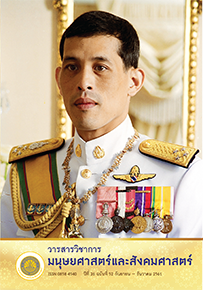Processes for Transferring Folk Medicine Healers’ Wisdom about the Use of Herbs for Treatment in Communities of Loei Province
Main Article Content
Abstract
The purpose of this research was to study processes for transferring folk medicine healers’ wisdom about the use of herbs for treatment in communities of Loei Province. The qualitative research methods used included an in-depth interview, participatory observation and focus group discussion. The findings revealed that bodies of herbal knowledge could be learned and classified from drug formularies for the treatment of various illnesses. The method of treatment by the folk healers was related to different beliefs and local cultures. As Buddhists, the folk healers believed that illnesses were caused by the Four Great Elements and the Five Aggregates. In addition, they believed that astrology and the horoscope could help predict the diseases of a person. The processes for transferring the wisdom of the folk healers included the inheritance from the ancestors, the transfer among the family members, the transfer by the traditional healers to interested persons, the transfer from the traditional healers to the patients completely cured by the treatment, the transfer from the academic institutions and the transfer by the traditional texts of drug formulary. The methods of transferring folk healers’ wisdom included the transfer at the family, community and national levels by the use of verbal communication, such as word of mouth and lectures. The transfer could be done by other means, such as demonstration, actual practice, self-learning from media, exhibition at learning resource centers and written records.
Downloads
Article Details
บทความทุกบทความเป็นลิขสิทธิ์ของวารสารวิชาการมนุษยศาสตร์และสังคมศาสตร์ มหาวิทยาลัยบูรพาเท่านั้น
References
ชูชาติ เหลี่ยมวานิช. (2537). เครือข่ายการเรียนรู้ในการดูแลรักษาสุขภาพของประชาชนในชุมชนชนบท.วิทยานิพนธ์ศึกษาศาสตรบัณฑิต, สาขาวิชาการศึกษานอกระบบ, บัณฑิตวิทยาลัย, มหาวิทยาลัยเชียงใหม่.
ดารณี อ่อนชมจันทร์. (2550). สภาวะสุขภาพกับวิถีการดูแลรักษาแบบพื้นบ้านของชาวอาข่ากรณีศึกษา ชาวอาข่าอำเภอแม่ฟ้าหลวง
จังหวัดเชียงราย. เชียงใหม่: สำนักวิชาวิทยาศาสตร์สุขภาพ มหาวิทยาลัยเชียงใหม่.
ปรีชา อุยตระกูล และคณะ. (2531). บทบาทหมอพื้นบ้านในสังคมชนบทอีสาน. ขอนแก่น: สถาบันวิจัยและพัฒนา มหาวิทยาลัย
ขอนแก่น.
พจนานุกรมฉบับราชบัณฑิตยสถาน. (2525). กรุงเทพฯ: อักษรเจริญทัศน์.
พระสุริยา มาตย์คำ. (2552). การพัฒนากระบวนการสืบทอดภูมิปัญญาหมอพื้นบ้านในประเทศไทยและ สาธารณรัฐประชาธิปไตยประชาชนลาว. วิทยานิพนธ์ปริญญาปรัชญาดุษฎีบัณฑิต, สาขายุทธศาสตร์การพัฒนาภูมิภาค, มหาวิทยาลัยราชภัฏเลย.
พิทยา สายนำทาน. (2540). กระบวนการทางสังคมที่เกี่ยวข้องกับพฤติกรรมสุขภาพอนามัยในชุมชนพื้นที่สูง. เชียงใหม่:
มหาวิทยาลัยเชียงใหม่.
ภัทรธิรา ผลงาม. (2554). การพัฒนาตำรายาสมุนไพรพื้นบ้านเพื่อรักษาโรคในชุมชน. เลย: มหาวิทยาลัยราชภัฏเลย.
รุ้งรังษี วิบูลชัย. (2538) .การดำรงอยู่ของการแพทย์พื้นบ้าน: กรณีศึกษาหมู่บ้านนาสีดา ตำบลข้าวปุ้น อำเภอกุดข้าวปุ้น จังหวัด
อุบลราชธานี. วิทยานิพนธ์ศิลปศาสตรมหาบัณฑิต, สาขาวิชาวัฒนธรรมศึกษา, บัณฑิตวิทยาลัย, มหาวิทยาลัยมหิดล.
วิชัย โชควิวัฒน์. ( 2546). นโยบายและทิศทางการพัฒนาการแพทย์แผนไทยและการแพทย์ทางเลือกของประเทศไทย. กรุงเทพฯ:
กรมพัฒนาการแพทย์แผนไทยและการแพทย์ทางเลือก กระทรวงสาธารณสุข.
สามารถ จันทร์สูรย์. (2536). ภูมิปัญญาชาวบ้านในภูมิปัญญาชาวบ้านกับการพัฒนาชนบท เล่มที่ 1. กรุงเทพฯ: อมรินทร์พริ้นติ้ง.
สำนักงานคณะกรรมการการศึกษาแห่งชาติ. (2541). แนวทางในการส่งเสริมภูมิปัญญาไทยในการจัดการศึกษา. กรุงเทพฯ:
อมรินทร์พริ้นติ้ง.
อานันท์ กาญจนพันธุ์ และคณะ. (2530). พิธีกรรมและความเชื่อล้านนา: การผลิตใหม่ของอำนาจทางศีลธรรม. กรุงเทพฯ: โรงพิมพ์คุรุ
สภาลาดพร้าว.


